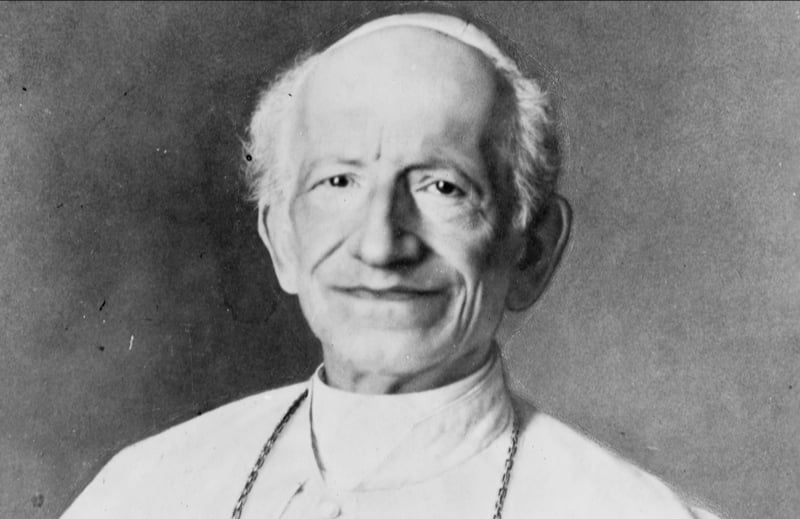The Dignity of Work
by Mr. Michael S. Davison, III

Pope Leo XIII focused his encyclical, Rerum Novarum, on the dignity of work and the dignity of the worker.
A Brief History of the Dignity of Work, As Set Forth in the Social Encyclicals
Pope Leo XIII’s landmark encyclical Rerum Novarum was published during the tempestuous years of the Industrial Revolution, and as such was The Church’s first social commentary – and our first resource in Catholic Social Teaching – considering the rights of the worker. His Holiness prefaced in this text the essential dignity in work itself:
“As for those who possess not the gifts of fortune… that there is nothing to be ashamed of in earning their bread by labor. This is enforced by what we see in Christ Himself, who… being the Son of God, and God Himself, …did not disdain to spend a great part of His life as a carpenter Himself.” (Rerum Novarum, 23)
Pope St. John Paul II carried forth this crucial antecedent in several of his letters. He also updated the message to our post-industrial ears, and abstracted the type of work involved to incorporate all of the work force, besides the physical laborers of Pope Leo XIII’s focus.
“[Christ], while being God, became like us in all things devoted most of the years of his life on earth to manual work at the carpenter’s bench. This circumstance constitutes in itself the most eloquent ‘Gospel of work’, showing that the basis for determining the value of human work is not primarily the kind of work being done but the fact that the one who is doing it is a person.” (Laborem Exercens, 6)
Work and the Virtue of Industriousness
In his letter Gaudium et Spes, Pope St. Paul VI first pointed out the profound causal link between the act of work and its effect upon the value of human development: “For when a man works he not only alters things and society, he develops himself as well. He learns much, he cultivates his resources, he goes outside of himself and beyond himself. Rightly understood this kind of growth is of greater value than any external riches which can be garnered. A man is more precious for what he is than for what he has.” (Gaudium et Spes, 35)
Pope St. John Paul II synthesized Pope St. Paul VI’s tutelage, and informed Catholic Social Teaching with the “Virtue of Industriousness,” eloquently articulated in Laborem Exercens in the following passages:
“Work is a good thing for man-a good thing for his humanity-because through work man not only transforms nature, adapting it to his own needs, but he also achieves fulfilment as a human being and indeed, in a sense, becomes “more a human being”.” (Laborem Exercens, 9)
“Without this consideration it is impossible to understand the meaning of the virtue of industriousness, and more particularly it is impossible to understand why industriousness should be a virtue: for virtue, as a moral habit, is something whereby man becomes good as man” (Laborem Exercens, 9)
“…this fact in no way alters our justifiable anxiety that in work, whereby matter gains in nobility, man himself should not experience a lowering of his own dignity. Again, it is well known that it is possible to use work in various ways against man, that it is possible to punish man with the system of forced labour in concentration camps, that work can be made into a means for oppressing man, and that in various ways it is possible to exploit human labour, that is to say the worker.” (Laborem Exercens, 9)
Work is Both an Obligation and a Right
Pope St. John Paul II distilled the concept of work to its essence, highlighting the right of all people to participate in this inextricable facet of life: “The obligation to earn one’s bread by the sweat of one’s brow also presumes the right to do so.” (Centesimus Annus, 43)
7 Defining Principles of Work
Building upon the foundation of his successors, in Caritas in Veritate Pope Benedict XVI clearly outlined seven defining principles of what “decent” work is:
- It expresses one’s essential dignity;
- It is freely chosen;
- It enables respect and freedom from discrimination;
- It allows families to meet their needs and provide for their children’s education;
- It permits free organization of workers;
- It “leaves enough room for rediscovering one’s roots at a personal, familial and spiritual level”;
- It guarantees retirees “decent standard of living.”
(Caritas in Veritate, 63)
Work and Integral Human Development
Pope St. John Paul II emphasized that the enterprise of work, in concert with the application of Catholic Social Teaching’s concept of integral human development in the work environment, increases both efficiency and productivity.
“The integral development of the human person through work does not impede but rather promotes the greater productivity and efficiency of work itself…” (Centesimus Annus, 43)
Pope St. John Paul II also pointed out that integral human development can only occur in the workplace when there are guarantees of basic needs, and an environment conducive to development, including:
- Political and economic stability
- The certainty of better prospects for the future
- Improvement of workers’ skills
- Training of competent business leaders who are conscious of their responsibilities
(Centesimus Annus, 35)





